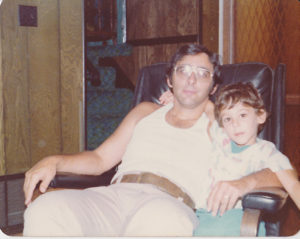I was out of the office this past Monday and Tuesday attending an Alumni Retreat of the Day School Leadership Training Institute (DSLTI). DSLTI is the preeminent preparer for new heads of Jewish day schools and I was lucky enough to be in its fourth cohort. In addition to the coaching and content that comes during your cohort experience, one of the greatest ongoing values of DSLTI is its robust alumni network. That alumni network gathers annually for a retreat and is typically a peak experience for attendees. The topic this year was “wellness” and I was asked to speak specifically on the connection between “transparency” and “wellness”. As those were concepts that I didn’t automatically connect, I spent some time proposing and then rejecting possible ideas.
Here’s what I did not talk about:
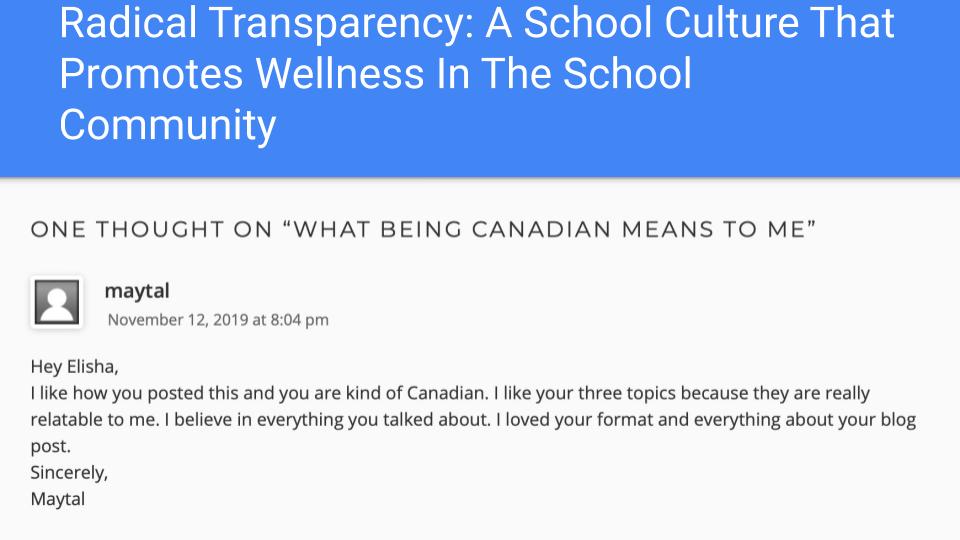
At first, I thought I would approach it from the angle of how blogs and blogfolios can actually promote wellness in our school culture through small, but meaningful acts of kindness.
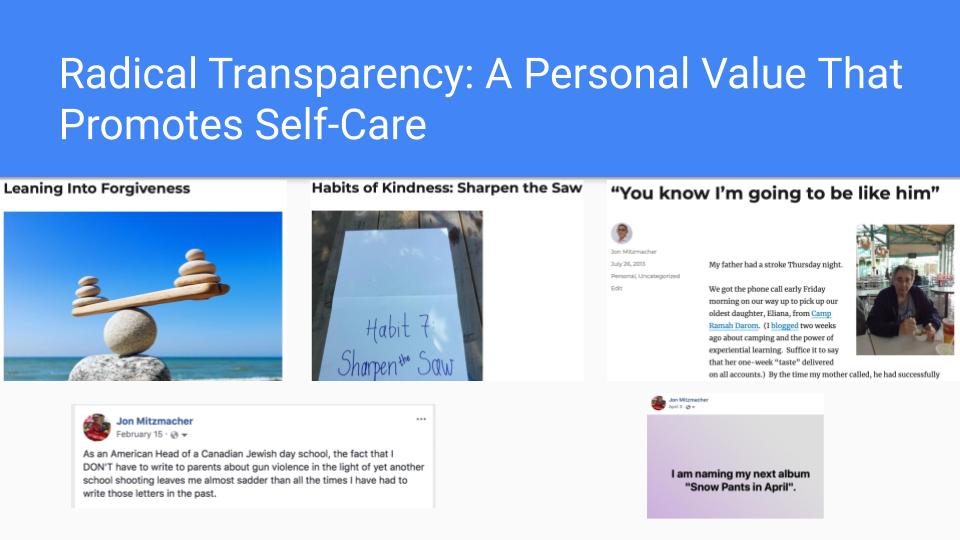
Then I thought I would come at it from how my own blogging and social media usage embodies transparency as a personal value that promotes my own self-care – talking about my personal flaws, coping with the death of my father, setting health goals, etc.
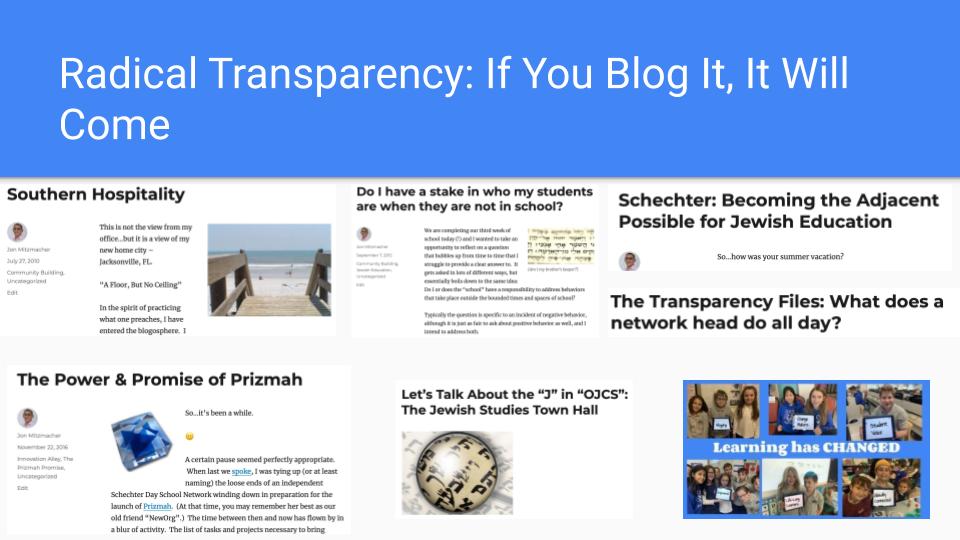
My next rejected idea was to talk about how I blog transparently about what I want to be true with the hope that by putting it out into the universe, I set in motion making it actually come true.
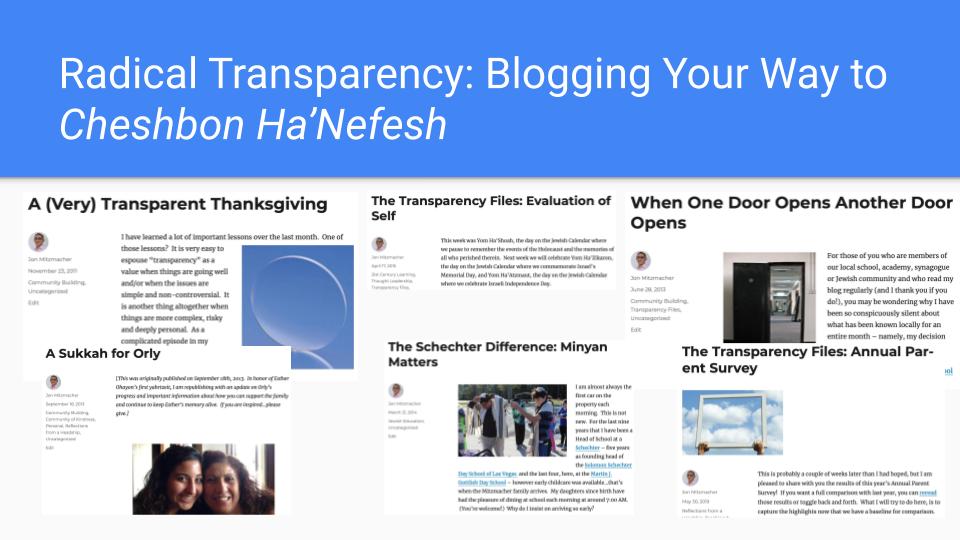
Next idea was to explore blogging as a form of personal cheshbon ha’nefesh – a self-accounting to inspire me to do and be better.
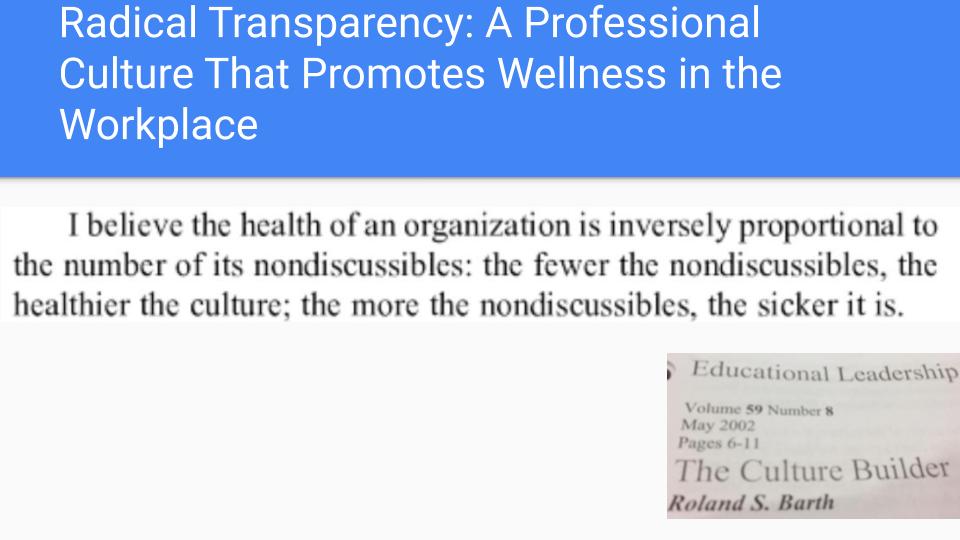
My final rejected idea was to explore how we use the concept of the “nondiscussible” to build a professional culture that promotes wellness in the workplace.

The truth is that I could have told compelling professional anecdotes about any of the above slides/topics. And since many of them are pulled from blog posts I have already written…I guess I already have. But because DSLTI is such an intimate environment, a safe place for heads of schools to get real with themselves and each other, I decided that I would go deeper and more personal. And so I landed here…
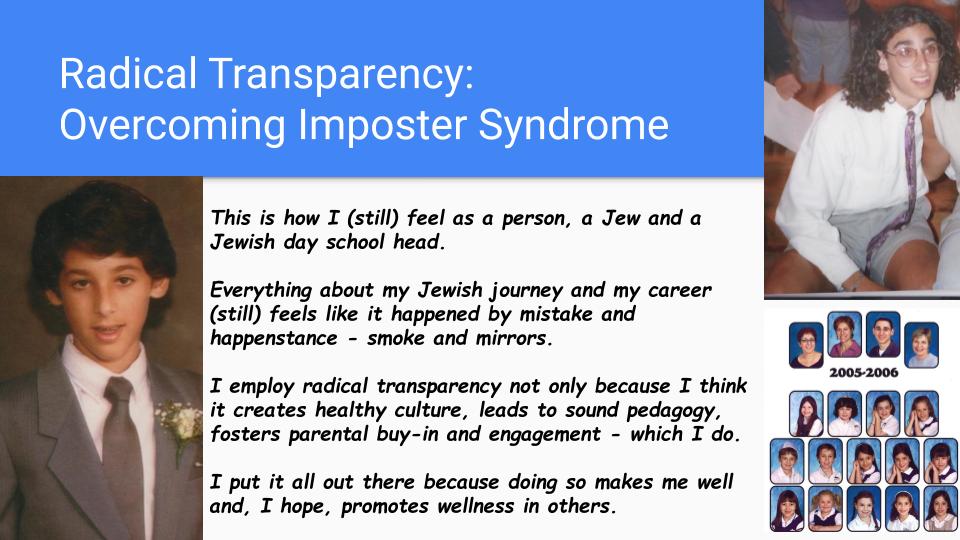
“Imposter Syndrome” is a common condition across all professions. It can be defined as…
…a collection of feelings of inadequacy that persist despite evident success. ‘Imposters’ suffer from chronic self-doubt and a sense of intellectual fraudulence that override any feelings of success or external proof of their competence. They seem unable to internalize their accomplishments, however successful they are in their field. High achieving, highly successful people often suffer, so imposter syndrome doesn’t equate with low self-esteem or a lack of self-confidence.
I can distill my “imposter syndrome” down to three anecdotes reflected in the slide above which served as the heart of my talk…
The handsome gentleman on the left is me at age 13. I was yet even more handsome at age 10 when we moved from Edison, New Jersey to Fremont, California. In addition to my amazing Jewish Neil Diamond hair, and owlish eyeglasses, I also brought with me to California an overbite of cartoonish proportions. My overbite was so large that I could fit two fingers (sideways) comfortably inside. The solution? A bionator.
My Google search for a bionator reveals to my surprise its continued existence, since I had imagined it would have been banned by the Geneva Conventions as a source of torture. In my parents’ great wisdom and to avoid my needing to wear braces until 35, not only did I get to wear the bionator for all of Grades 6 and 7, I also got to wear headgear 18 hours a day. And one of those days was, in fact, the very first day of school.
In a new school.
In a new state.
I show up for the first day of Grade 6 with my bionator in, Jewish locks pouring through the headgear and owl eyes. As just one example of how awesome that was, because the bionator took up every inch of space in my mouth, I had to take it out to speak. And because I needed a toolset to take it out, I had to have prearranged times with my teachers for when I was going to be called on. (I swear this is all true.) My Math Teacher would tell me that she was going to call on me at 10:45 AM and then at 10:30 AM I would take out my toolset and start unhooking myself. My time would come, I would say, like, “5x,” and then I would hook myself back together.
How I ever met a friend is an enduring mystery…
That “first-day-of-school-in-a-new-school-wearing-a-bionator” is how I feel each time I walk into a new room with new people.

The hirsute gentleman in the upper righthand corner is me at age 23. I had taken a year after university to try to figure out what path in the Jewish professional world I wanted to walk down and landed at Jewish Education. Based on my Reform Jewish background, I should have wound up in the master’s program at the Hebrew Union College-Los Angeles. And I likely would have if not for the friend of my mother’s who told her that if I was already going to down to LA for an interview at one seminary, that I might as well visit the Conservative one, the University of Judaism (now American Jewish University). So I set myself up an interview…
They told me that my day was going to begin with “minyan” and I said, “Great!” even though I had no idea what that was. To paint the full picture, I wore my hair that day in a ponytail (which I assumed was more professional), put modest earrings in my four piercings, wore the only long pants in my possession coupled with Naot (Israeli Birkenstocks). That is how I looked when a grad student met me and escorted me to the school’s beit knesset for minyan. That morning was the first time in my life I had ever seen tefillin or a Hebrew siddur. It was the first all-Hebrew service I had ever attended and I was totally unfamiliar with the words and the tunes.
Why I wound up attending that school and the larger Jewish journey it took me on is a longer story…
That “first-time-in-minyan” is how I feel every time I enter a synagogue.

The picture in the lower righthand corner of the slide is not a class photo. That is the school photo from my first year as founding head of the recently closed Solomon Schechter Day School-Las Vegas. Grades 1 & 2, 14 students, three teachers and me. The story of how that school came into existence and how I came to be its founding head is long and complicated. It is, in fact, the subject of my doctoral dissertation and should you wish to join the exclusive club of my dissertation committee, my mother and my wife, I invite you to look it up and read it. Needless to say, I was not a typical applicant for this job having never attended, worked or virtually ever stepped foot inside a day school until applying to be a founding head.
I distinctly remember the part of my interview where I attended a parlour meeting for prospective parents at the home of the rabbi who was spearheading the school’s creation. At that time there were only the 6 students continuing into Grade 2 and prospective parents for what would turn out to be 8 students beginning Grade 1. Because of my utter lack of experience and network – I was only accepted into DSLTI after I somehow got the job – the only way I could prepare for the interview was to do some light internet research. I landed on PEJE’s (Partnership for Excellence in Jewish Education, now folded into Prizmah) PDF for launching new Jewish schools and tried to commit it to memory.
At this parlour meeting was a set of parents who had graduated from The Ramaz School, a very prominent Modern Orthodox Day School in Manhattan and they asked me a ton of very reasonable and practical questions to try to ascertain how on earth I was qualified to found this new school. As I stood in the foyer sweating through my suit, stumbling to express my views on secular curriculum, Jewish curriculum, pedagogy, Hebrew, and anything and everything else about running a school, I was quite convinced that this was the beginning and the end of my career in Jewish day school education.
Why I wound up getting the job and the larger arc of my career that it launched is a longer story…
That “sweating through my suit” is how I feel at all our town halls.

The feedback from my DSLTI peers when I gave this presentation was instructive. Many shared with me that they had no idea that I felt that way – I seem so confident or I appear to have a strong leadership presence. And like most people, I both do and I don’t. I have obviously grown and learned and failed and succeeded and achieved and done a lot since I was 10, 23 and 33. But that’s the way imposter syndrome works for us all.
So there you have it. The simple truth is that I employ a kind of radical transparency not only because I think it creates healthy culture, leads to sound pedagogy, fosters parental buy-in and engagement – which I do.
In a sense “transparency” is my superpower. It is the superhero cape I adorn that lets me be my best self. I put it all out there because doing so makes me well and, I hope, promotes wellness in others. Ken y’hi ratzon.

This will be my last blog post before we go onto Winter Break next week. Wishing everyone a joyous Chanukah, a Happy New (Secular) Year and a relaxing break. We look forward to welcoming everyone back to school in 2020!




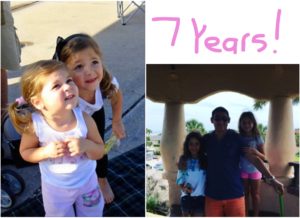 sense of what a chapter that long in a life truly means. We’ve all aged, but our girls have definitely aged in a much more fun way than their parents. Professionally, I have had the unique (at least in my profession) opportunity to share farewells from each of the three amazing professional opportunities that occupied much of my time while living in Jacksonville. Our journey from Las Vegas to Jacksonville was to assume the headship of the
sense of what a chapter that long in a life truly means. We’ve all aged, but our girls have definitely aged in a much more fun way than their parents. Professionally, I have had the unique (at least in my profession) opportunity to share farewells from each of the three amazing professional opportunities that occupied much of my time while living in Jacksonville. Our journey from Las Vegas to Jacksonville was to assume the headship of the 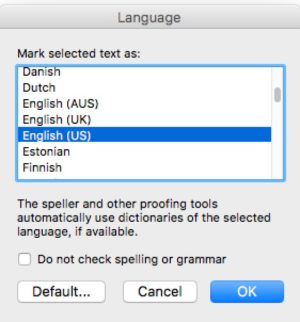

 I’ll have much more to say in the weeks and months ahead about the work, the school, and the move. We are neck-deep in emigration law and relocation logistics. I appreciate all the unintentional political jokes moving to Canada provides at this unique moment in time. I know it will be cold.
I’ll have much more to say in the weeks and months ahead about the work, the school, and the move. We are neck-deep in emigration law and relocation logistics. I appreciate all the unintentional political jokes moving to Canada provides at this unique moment in time. I know it will be cold.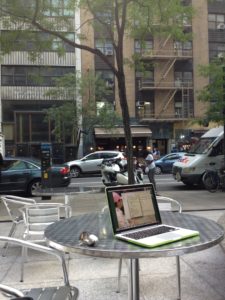
 NewOrg and less and less from us as the transition from what was to what will be grows closer each day. Critical information about “Membership”, “Conference”, “Fee For Service”, “Staffing”, etc. – the stuff you really need to know in order to better understand your engagement with NewOrg next year and beyond is finally making its way to the field. And not a moment too soon (and maybe a few moments too late) considering our earliest schools are already beginning to close for the summer.
NewOrg and less and less from us as the transition from what was to what will be grows closer each day. Critical information about “Membership”, “Conference”, “Fee For Service”, “Staffing”, etc. – the stuff you really need to know in order to better understand your engagement with NewOrg next year and beyond is finally making its way to the field. And not a moment too soon (and maybe a few moments too late) considering our earliest schools are already beginning to close for the summer. We don’t know exactly what or who the future will bring. But we know what the past and present has meant. On behalf of the staff and the board of the Schechter Day School Network, let me thank all our stakeholders one last time and to be clear that we are not saying shalom, but l’hitraot.
We don’t know exactly what or who the future will bring. But we know what the past and present has meant. On behalf of the staff and the board of the Schechter Day School Network, let me thank all our stakeholders one last time and to be clear that we are not saying shalom, but l’hitraot.

